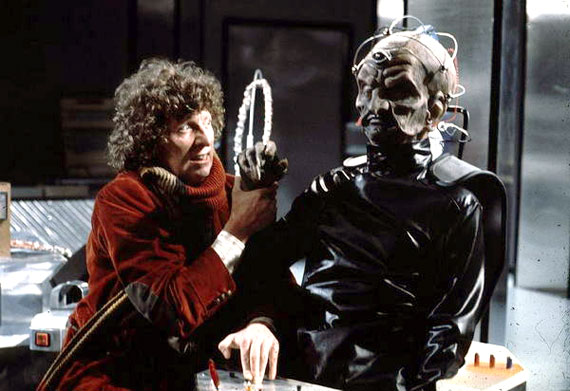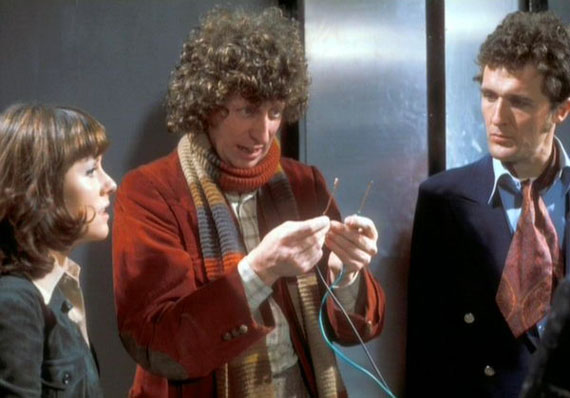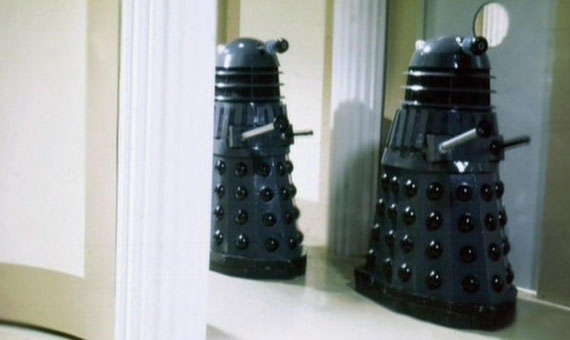The Impact of Genesis of the Daleks

As we countdown to the return of the Daleks, guest contributor Patrick Durston looks back at their most important story.
A Whoniverse without Genesis of the Daleks would be a boring one. In fact, most of Doctor Who’s mythos wouldn’t have been spawned without this master-class story. As a long-time fan of the Daleks, I have a particular love for everything about Genesis. Apart from the the fact that it marks the first ever appearance of the evil, maniacal, Machiavellian Kaled cyborg genius that we all know and love as Davros, the adventure has been marked as the greatest Doctor Who serial of all time, possibly on the account of its brilliance as a major story. For the uninitiated who aren’t familiar or with it or have yet to see it, you should be able to understand why it gains the exposure it gets.
But what makes this classic from 1975 so important and popular, or that behemoth in the big wide Whoniverse? What makes this story written by the late, great Terry Nation (the genius responsible for bringing us the Daleks in the first place) that serial to top Doctor Who Magazine’s “greatest Doctor Who story ever” vote in 2004? Where does the impact come from? Let’s take an extensive look…
Genesis of the Daleks is a six-part serial that sees the Fourth Doctor intercepted by a Time Lord who gives him an important instruction to interfere in the creation of the Daleks on war torn Skaro, as a means of either averting their creation from becoming the future controllers of the universe, or changing their genetic make-up so they evolve into “less aggressive creatures.” To complicate this task even more, the Doctor and his companions Sarah Jane Smith and Harry Sullivan are caught in the middle of an ongoing war of attrition over the planet between the races the Thals and the Kaleds, whilst also seeing both sides of the conflict. The Doctor then discovers the evil genius behind the creation of the Daleks, Davros, who has intentions of having his proud creations become rulers. Here, the Doctor witnesses the roots of his most infamous enemies, whilst facing against the power hungry, insane creator Davros. Fulfilling the task is not quite that easy, as he and his companions face extreme peril, difficulty and moral dilemmas in stopping both the Daleks and Davros from achieving their goals…
Genesis is everything great that you should expect in a marvellous Doctor Who story – a whole recipe for success. It’s packed with a hugely intelligent plot and is full of articulation in its brilliant dialogue and plot, and is always attentive to its detail. It has a well balanced level of pace too, enough to keep you gripped throughout all six episodes. Along with that is a perfect injection of dark, scary and sinister tones, and a profound sense of unease and urgency to the whole scenario. And not to forget, it has plenty of running down corridors as well, just to add a nice bit of dynamics and sense of danger to the whole set-up. These elements work in perfect harmony with each other.
Genesis gains even more of an impression for being able to display a convincing wealth of themes and imagery that course throughout it. The behaviour of cruelty, the dangers of experimentation, the severity of dictatorship and fascism, the horrors of warfare, the necessities of resistance, and the lessons from both morality and immorality. Many of these are played with and layered into the fabrics of Genesis, and the serial does an amazing job in making them feel fully real within the plot. It’s also the acting of both the protagonists and antagonists that support the realisation of the themes as well. It’s through most of them that we see the nature of the dreaded, dystopian scenario and the bleak, intense atmosphere that they’re all caught in in the unforgiving and unsentimental world on Skaro.

Along with the themes, there is imagery that draw distinctive parallels to many elements from Nazi ideology during the Second World War. Whether it’s from the behaviour of the Kaled regime, the black SS like uniforms, the Iron Cross that Davros’ henchman Nyder wears, to the Hitler-esque principles of Davros with his ideas of racial purity and the nature of his Daleks. It’s all there inside the make-up of it, and all elegantly portrayed. Even the battlefields where the Thals and Kaleds conduct their warfare is strongly reminiscent of the trenches in the First World War, with the Thals resembling WWI soldiers, carrying rifles and wearing gas masks. Terry Nation wanted to draw the story as an allegory to post -war events at the time, and he certainly did so with a remarkable connection between history and sci–fi television, combining the two together effortlessly and making Genesis more than just a simple cliché. That’s what I believe makes this story ever more powerful and scary, through it’s blatant use of Nazi subtext to tell the story on Skaro.
Of course, what makes the serial even more brilliant is the compelling performance from Michael Wisher as the cunning, malevolent and manipulative Davros, who emphasises the characters’ terrifying visions and ideologies effortlessly. He is frightening, and his sheer on screen presence is mostly chilling. His fanatic personality is always there for you to see, to remind of the person he is. Whilst he displays himself to be nothing but a tyrannical creator, there are moments where he shows subtlety, which makes him even more sinister and menacing.
Wisher plays him to a tee. In my honest opinion, the best Davros is the one we see here in Genesis. Whilst later versions of him played by the likes of Terry Molloy and Julian Bleach (I try to forget about David Gooderson’s portrayal, there again I feel sorry for what he had to put up with) are all great, none of them have the same true impact as Michael Wisher’s version does. Davros in later subsequent serials became more over the top and grandiose in his megalomania, and whilst this is isn’t considered a bad thing, it however took away the less poeticalness in which Davros had.
And if the reward for best amount of epic dialogue and speeches is made, then it has to go to Davros, simply because they are completely memorable and always quotable. Wisher puts so much emphasis into them, and they’re great to hear and play back simply for the impact. And whilst I mentioned the fact that future portrayals of Davros have that OTT elements to them, it’s fair to say that his speeches in this do have that essence to them as well. But there again, it works perfectly and it never stagnates in quality. Wisher truly represents someone who has been totally corrupted by his fanaticism.
The title of the serial may, for some, come across as misleading, as the story is less about the Daleks and more about the affairs and characters on Skaro. However, this works to their benefit, as the Daleks are used sparingly. They’re saved up effectively and whenever they’re used, their minimal presence is made up for in terrific scenes of them being deployed. What’s brilliant is, like their creator, they are depicted to be as scary and as threatening as him. It’s easy to see how the “behind the sofa” phenomenon existed when you watch the Daleks in action. To me, the atmosphere and environment on Skaro reflects the type of mutants the Daleks are. The planet is shown as a harsh, brutal, torn place, much like the Daleks really. And the cold colour palette, sterile looking facilities of the Kaled base that they’re manufactured in is a perfect place for such evil things to be made. I love that environmental reflection that the story does well in painting.
The trouble with the Daleks in the 70’s is that they were overused quite a lot. We always make it known that Russell T Davies’ era did this constantly, yet the 70’s had it’s own fair share of tiring them out as well. This is the reason why Terry Nation created an origin story; simply to use them carefully in order to readdress their balance as already iconic villains to dominate television at the time, and there was method to the madness of not having the Daleks take up a lot of scenes in Genesis. It worked wonderfully well, as even when you look back, it’s noticeable that the fear factor somewhat dropped each time they were used. Nation did the right thing.

In conclusion, the explanation for why Genesis of the Daleks remains the greatest classic ever made in the show is solely down it’s fantastic plot, great performances, brilliant intelligent subject matter and the range of dialogue made. Genesis is a masterpiece. I would also go as far as to say that it’s one of Tom Baker’s best act played; he really hits the nail in so many areas of this serial. Praise also goes to both the late Elisabeth Sladen and Ian Marter in their roles as the Doctors companions Sarah Jane Smith and Harry Sullivan, who both share an excellent dynamic with the Doctor in this story. As far as other performances go, they are all truly exceptional, notably from Michael Wisher’s, to Peter Miles’ who plays the slippery henchman Nyder. Other supporting characters do their bit to the plot as well by presenting their own unique acts as well. The story relies on a great amount of it.
All of those factors is what makes Terry Nation’s finest story ever that timeless brilliance that will never be forgotten by the whole Doctor Who fandom. It was voted #1 story for a solid reason, and it would be futile to try and argue with that deserved status. Admittedly, the story does suffer from a little bit of paddling in some areas but you know, that’s a minor fault that isn’t enough to bring down this ingenious piece of high watermark Doctor Who drama.
I now look forward to Steven Moffat’s Asylum of the Daleks which is opening the hotly anticipated Series 7, where no doubt my favourite classic Dalek variant from this story will be utilised within the plot very well.
And on that note, long live Genesis of the Daleks. The template for all following Dalek stories, and in my humble opinion, the greatest Dalek/Davros story ever to be made…
“We are entombed but we live on. This is only the beginning. We will prepare, we will grow stronger. When the time is right, we will emerge and take our rightful place as the supreme power of the universe!”








